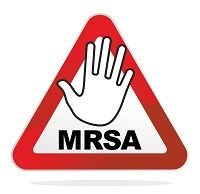Article
MRSA Decolonization: Balancing Intervention with Potential Resistance
Author(s):
Many patients contract MRSA during their ICU stays, and it can progress to serious infections and chronic colonization with a high likelihood of recurrent infection. The leading intervention is primary precautions, including contact precautions and active surveillance testing.

Intensive care units (ICUs) across the nation struggle with methicillin-resistant Staphylococcus aureus (MRSA). ICUs can be primary reservoirs for MRSA. Many patients contract MRSA during their ICU stays, and it can progress to serious (eg, pneumonia, soft tissue, and bloodstream) infections and chronic colonization with a high likelihood of recurrent infection. The leading intervention is primary precautions, including contact precautions and active surveillance testing (AST). Some institutions use a second step, universal decolonization with chlorhexidine and intranasal mupirocin, but infection control experts worry about potential resistance when all patients are treated.
A 14-bed Korean surgical ICU implemented targeted MRSA decolonization therapy after basic precautions failed to improve its colonization and infection rates. Their study appears ahead-of-print in the American Journal of Infection Control. For them, decolonization worked.
Over 40 months, they monitored all patients for MRSA. In the baseline period, they performed AST for MRSA at admission. Patients who had positive nasal swabs were isolated with contact precautions and monitored with weekly nasal swabs. Patients who were MRSA-negative at admission were not monitored further.
In the last 20 months of the study, MRSA positive patients were decolonized over 5 days with chlorhexidine baths and intranasal mupirocin. All patients, regardless of their admission status, were monitored twice weekly.
The clinical incidence of MRSA decreased by 61.6% after the researchers implemented the decolonization procedure.
Of 169 MRSA isolates, 64 (37.8%) carried the qacA/B genes, which is an indicator of a high likelihood of mucopiricin resistance. This gene varies considerably by location.
Twenty-two isolates (13%) showed low- (n = 20) or high-level (n = 2) resistance to mupirocin. Over the course of the study, low-level mupirocin resistance increased from 0% to 19.4%, which was concerning.
The researchers note that some experts advocate for universal decolonization in ICUs. They indicate they are not in favor of a universal approach, citing the potential for increased resistance, unnecessary drug use in patients who are not MRSA-positive, and cost as concerns.





